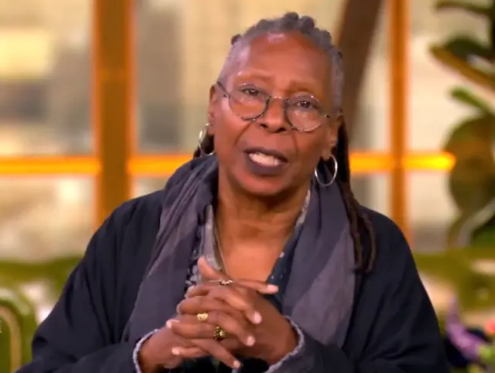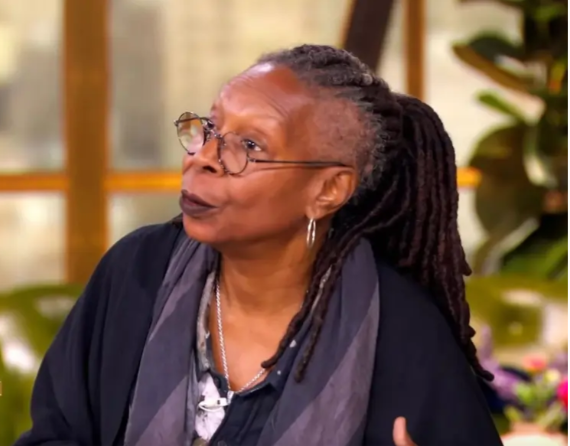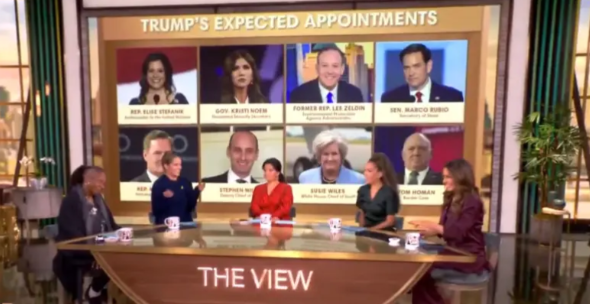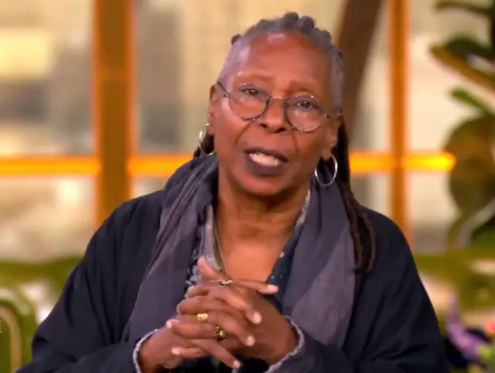Whoopi Goldberg admits she’d leave ‘The View’ if she had more money: ‘I work for a living’-s1
Whoopi Goldberg, the outspoken co-host of The View, recently opened up about her motivations for staying on the talk show, revealing a surprisingly relatable reason: financial necessity. During a discussion about the struggles of working Americans, the 68-year-old actress and comedian shared that if she were wealthy enough, she wouldn’t be on the show. Her comments provide a rare glimpse into the real-life responsibilities that even celebrities face, challenging the public perception of financial security in Hollywood.
Whoopi’s Candid Confession: “If I Had All the Money in the World, I Would Not Be Here”

Goldberg’s candid remarks surfaced during a “Hot Topics” segment on The View, where she discussed the financial pressures many Americans are facing. Addressing the audience and her co-hosts, she admitted, “If I had all the money in the world, I would not be here, OK? So, I’m a working person, you know?” For viewers who assume that Hollywood stars are financially set for life, Goldberg’s statement sheds light on the reality that not all celebrities are insulated from financial responsibilities.
This admission added a relatable layer to her persona, showing that she, too, must work to support her family. “My kid has to feed her family. My great-granddaughter has to be fed by her family. I know it’s hard out there,” she explained, striking a chord with many Americans who support multiple generations. Her words emphasize a shared reality: that even high-profile figures work to fulfill family obligations, a reality that resonates deeply with her audience.
Whoopi’s Long Journey on The View: Balancing Fame with Financial Responsibilities
Since joining The View in 2007, Whoopi Goldberg has become one of the show’s most recognized and longest-serving co-hosts. Her tenure has been marked by her bold opinions, quick wit, and fearless approach to controversial topics. But as her recent confession reveals, her decision to stay on the show is not solely driven by passion; it’s also a practical choice to maintain financial security for herself and her family.
Goldberg’s journey on the show hasn’t always been smooth. Known for her strong views, she often finds herself in heated debates with her co-hosts, stirring controversy along the way. Yet, her recent statements suggest that her commitment to The View is as much about financial necessity as it is about being a voice for the public. For Goldberg, remaining on the show is a responsibility she shoulders to support those who depend on her.
Speaking Out on Grocery Prices: “The Folks That Own the Groceries Are Pigs”
Goldberg’s recent remarks didn’t stop at her personal motivations. She took a bold stance on the issue of grocery inflation, drawing criticism by attributing rising prices to grocery store owners rather than larger economic factors. In a controversial statement, she argued that grocery bills aren’t high because of the economy but due to “the folks that own the groceries,” whom she referred to as “pigs.” The statement, while resonant for many frustrated by inflation, triggered backlash from the grocery industry.
The National Grocers Association (NGA), representing over 21,000 grocery stores across the U.S., responded sharply. NGA Chief Executive Greg Ferrara sent a letter to The View’s executive producer, expressing concern over Goldberg’s comments. Ferrara explained that grocery stores often operate on razor-thin margins—sometimes as low as 1-2%—and that most grocers are not profiting significantly from inflation. He highlighted that store owners, especially independent ones, face rising costs from every level of the supply chain, from labor to raw materials.
Industry Response: Grocers Push Back Against Goldberg’s Claims

Goldberg’s remarks sparked swift criticism, particularly among small and family-owned grocery stores that felt unfairly targeted. For example, Zulema Wiscovitch, a co-owner of two grocery stores in New York City, voiced her frustration, saying, “It shows a lack of understanding of what’s going on with the economy.” Wiscovitch explained that grocery store owners are struggling with inflation just like everyone else, facing increasing costs from manufacturers and suppliers.
The NGA echoed these concerns, stating that accusations like Goldberg’s can lead to increased hostility toward grocery employees and store owners. This industry response points to the complexities of inflation, suggesting that pinning blame solely on grocers oversimplifies a much larger issue and fails to consider the challenges that these businesses face in today’s economy.
Understanding the Real Causes of Grocery Inflation

While Goldberg’s frustration over grocery prices may echo the sentiments of many Americans, experts emphasize that food inflation stems from a combination of factors beyond the control of individual store owners. Higher labor costs, supply chain disruptions, increased fuel prices, and production costs all contribute to the rising prices that consumers see in stores.
Ferrara and others in the grocery industry highlight that the pandemic has significantly affected supply chains, driving up costs across all levels of food production and distribution. By simplifying the issue to grocery store ownership, critics argue, Goldberg’s comments fail to address the broader economic factors that impact grocery prices.
Whoopi’s Connection with the Working Class: A Blend of Empathy and Misunderstanding

Goldberg’s comments reveal both her empathy for the working class and the limits of her understanding of certain economic issues. Her confession about working to support her family resonates deeply with viewers who face similar financial pressures. This openness humanizes her in a way that resonates with millions of Americans who work tirelessly to support their families.
However, her comments regarding grocery prices suggest a potential disconnect with the realities of small business ownership. While her critique resonates with those frustrated by inflation, grocery store owners argue that the comment reflects a misunderstanding of the challenges facing the industry. Goldberg’s statements highlight the need for public figures to take a nuanced approach when discussing complex economic issues, particularly when their words impact essential workers and small business owners.
Conclusion: Whoopi Goldberg’s Remarks Reflect Broader Economic Frustrations
Whoopi Goldberg’s recent statements on The View, from her candid confession about financial obligations to her controversial comments on grocery prices, capture the mixed emotions and struggles that many Americans experience today. Her willingness to speak openly about her financial motivations bridges the gap between her celebrity status and the everyday experiences of her viewers, reminding us that financial responsibilities are universal.
At the same time, her comments on grocery prices reveal the complexities of discussing economic issues on a public platform. While her frustration with inflation is widely shared, her criticism of grocery store owners underscores the importance of addressing these issues thoughtfully. Small business owners face their own battles with rising costs, and many in the industry argue that shifting blame to individual grocers oversimplifies a much larger problem.
In the end, Whoopi Goldberg’s voice remains powerful, sparking conversations and encouraging viewers to engage with issues that impact their lives. Whether or not one agrees with her, her candidness about work, family, and economic pressures offers a unique perspective on the intersection of celebrity and real-life challenges. Her statements remind us that while public figures have influence, they also share many of the same responsibilities and concerns as those they aim to represent.



